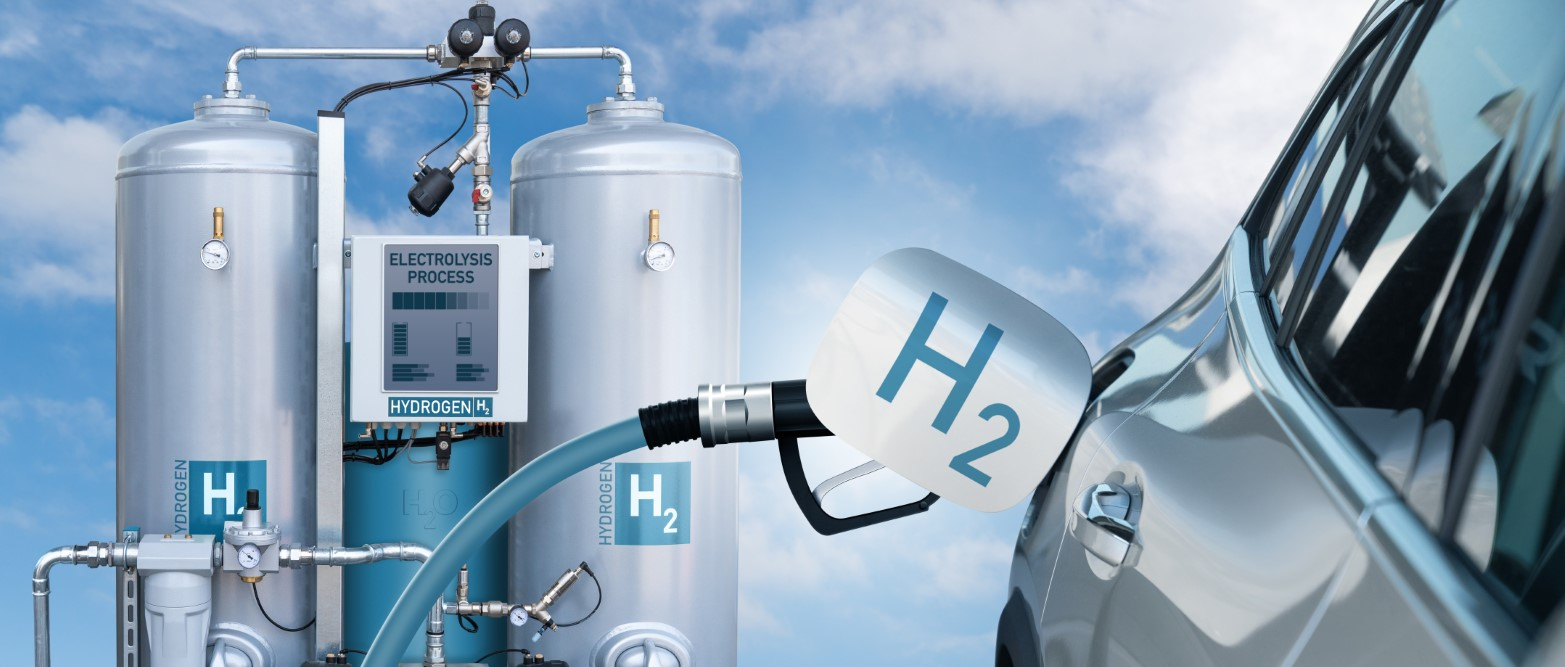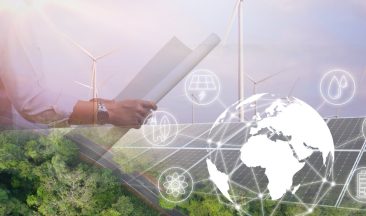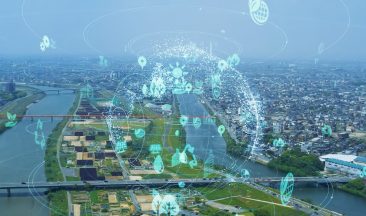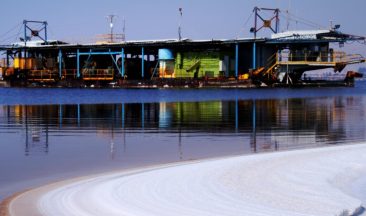The Need for a New Hydrogen Economy
There is now a wide consensus that human dependence on burning fossil fuels to generate energy is both environmentally damaging and unsustainable. Fossil fuels are derived from finite sources and are often extracted, processed, and distributed at a high cost to the environment. When they are burned, they release damaging greenhouse gasses (GHGs).
After centuries of uncontrolled GHG emissions, we’re now in a pivotal decade that is seeing the beginning of a mass transition to sustainable energy derived from clean sources like solar, wind, tidal and geothermal power. Governments are allocating huge resources to the development of sustainable energy and are gradually mandating a simultaneous transition to electric vehicles.
The realization that fossil fuels are largely obsolete, increasingly depleted, and inherently dangerous coincides with other major challenges facing the human race. These include climate change and population growth – both issues are inextricably linked to our traditional dependence on fossil fuels and the urgent need to transition to sustainable, affordable, and environmentally friendly energy sources.
Many people are already familiar with the continual debate surrounding electric vehicles, renewable energy, and a seismic transition away from high-polluting fossil fuels. The concept of a green hydrogen economy is less well known, but a global hydrogen economy could play a key role in achieving sustainable energy and tackling the challenges of climate change and population growth.
ICL’s Yaniv Steiner joins us to explain the broad concept of a hydrogen economy, as well as the advantages – and challenges of a new hydrogen economy.
Hello Yaniv, and thank you for agreeing to talk to us today. Perhaps you’d begin by telling us a little about yourself and your role at ICL.
Hi, my name is Yaniv Steiner and I’m the head of the Energy Management Department at ICL. It’s a job that I love. My background is in business and economics and I have an MBA in finance. After graduating I spent about 5 years working in marketing in the high-tech industry in the Tel Aviv area.
When first hired by ICL, I spent three years as an energy analyst, studying energy trends. The analytical skills I’d previously gained in marketing were very useful. Then, I got promoted to head of the Energy Management Department, I have been there for the last three years.
My day-to-day role involves all the responsibilities of energy management and sustainable energy alternative fuels, including ensuring energy efficiency and managing the supply of steam, power, and gas for ICL’s Sdom site.
For the last year and a half, I’ve been leading the ‘hydrogen energy pillar’ at ICL (developing the concept of our own green hydrogen economy) as part of the Green Sdom project. We’re working to decarbonize Sdom, ICL’s flagship site at the Dead Sea.
The energy transition program is designed to meet ambitious sustainability targets, namely a 50% reduction in net carbon emissions by 2030 and zero net carbon by 2050.
The development of a hydrogen-based economy as a clean power source will play a role in achieving those targets. It’s an inspirational and exciting project and hydrogen gas is going to be a game-changer in several key fields!
That’s really interesting, I didn’t know that ICL generates its own power.
ICL has a highly efficient power plant for some of its Israeli operations – mainly the extraction and processing of potash, bromine, magnesium, and other materials. We still maintain a connection to the national grid for backup in the event of an emergency.
We also sell surplus energy back to the national grid. It’s a working relationship that requires detailed coordination with the authorities and dealing with contractual issues. Maintaining a good working relationship that satisfies all parties is a key part of operations.
Our power plant isn’t part of the green hydrogen economy yet, but ICL is intensely focused on sustainability and the transition to (affordable) clean power. We will integrate hydrogen into our own energy-generating system in the future, possibly to back up and supplement other green energy sources.
So what is meant by the term hydrogen economy?
Different people have different parameters, but in essence, a hydrogen economy is a future economy where cleanly generated hydrogen is the primary fuel for applications that can’t be electrified, as well as some that can, like vehicles. The simple reality is that we’re using too many fossil fuels to meet our energy requirements and need better solutions.
Hydrogen has some really exciting applications and uses and is one solution within a holistic approach to the issues of climate change and energy transition.
What we’re now seeing is a transition to electrification (via sustainable sources) in some really important areas. The US government’s backing of electric vehicles is the most obvious example. Plenty of governments around the world are also legislating for electricity generation through solar, wind, and tidal power. The impetus is there, and it comes all the way from the top.
The problem is that there are key niches – even fields – in agriculture and industry where a complete switch to electrification simply isn’t practical. I’m talking about furnaces that have to maintain temperatures in excess of 1,000℃, power-draining heavy machinery, and 80-ton trucks.
We need eco-friendly fuels for these processes and hydrogen is currently the strongest contender.
What are the advantages and disadvantages of a hydrogen economy?
Well, here are some of the advantages of a hydrogen economy and how I envisage it optimizing ICL’s future operations (and the global economy in general).
Firstly, burned hydrogen does not create greenhouse gas emissions. When we burn hydrogen under controlled conditions it easily creates enough energy to power turbines, boilers, fuel cells, etc. The only byproduct is water vapor. Anybody who’s worked in the desert will understand that a steady byproduct in the form of water is a gift, not a problem!
When using clean electricity to extract hydrogen from water, the processed gas is cleaner than any current alternative. Hydrogen can easily replace other fuels in most industrial and agricultural settings. It can sometimes even be stored and transported using existing natural gas infrastructure, or very similar purpose-built infrastructure.
We already have the knowhow to manage hydrogen on a major scale, possibly via converted existing power plants and pipelines. We can store, transport and burn hydrogen without major innovations: the skillsets are the same.
One of the things I really like about hydrogen is that once produced, it can be stored for several months without degrading. An organization like ICL can stockpile hydrogen reserves to cover seasonal variations in daylight or wind-dependent energy supplies. It’s one of the few commercially viable storage model for green energy and ranks alongside other innovative energy storage solutions.
Hydrogen also stores a lot of energy per unit and has great volume/weight efficiency. Off the top of my head, 1 kilo of hydrogen might fuel a family car for 100km. 5 kg equals a full tank that can be replenished in just a few minutes.
The other really exciting application for hydrogen is fertilizer production, the implications for a supply of affordable chemical fertilizers are enormous. It could transform food production.
What are the challenges of a hydrogen economy?
The single biggest challenge of a hydrogen economy is to develop a cheap and environmentally friendly process for the mass extraction of hydrogen from water and affordable storage solution for mass storage. Once we crack those – and I believe we will – a global hydrogen economy will become a rapidly developing reality.
Other challenges of a hydrogen economy include the need to adapt vehicles for the safe storage of hydrogen fuel. This is comparable to the challenges of early petrol engines or initial safety issues with batteries in EVs. I don’t see it as a major obstacle. Likewise, we’ll need to optimize the conversion of hydrogen to electricity within fuel cells. These are the kind of projects that ICL is well equipped to contribute to – we’ve already done amazing work with smart batteries.
There are other minor challenges with hydrogen. For example, we add a distinctive odor to natural gas to alert users to any leak. We can’t do that with hydrogen yet, so it might not be suitable for domestic cooking appliances. It could be used to fuel boilers and cars.
How does the hydrogen economy work and is ICL using hydrogen in any of its current commercial ventures?
Currently, Hydrogen has no significant role in major ICL operations, but that’s about to change. We have some hydrogen as a byproduct of chlorine manufacture and some surplus from our bromine plant. We’re exploring how to use it in generators and as fuel for forklifts, drones, and other transportation applications. Incidentally, hydrogen may provide the solution for green aviation fuel for long-haul flights.
The future (say 20 years) will be unrecognizable due to green energy and associated energy tech. The speed of innovation and the development of new green energy sustainable solutions will astonish a lot of people.
ICL aims to be among the first to exploit new applications for a hydrogen energy economy. We’re in a transitional period that inevitably involves trial and error and experimentation.
ICL has the talent and the resources – and innovation is part of our corporate DNA.
Once we can reduce the cost of the electrolysis process (using green energy) and lower the cost of extracting the H from the H20, the possibilities will be endless. Some sectors simply can’t be electrified and hydrogen is the only option for green energy. As costs come down, exponential demand will drive innovation, and we’re innovators.
As economies of scale improve, ICL will be perfectly positioned to invest in R&D and infrastructure, build strategic partnerships, and claim a major share in the new markets. We’re already doing it with minerals for energy storage and sustainable fertilizers. Hydrogen is the next leap forward – or one of them anyway.
The hydrogen energy economy holds tremendous potential as a sustainable pathway to the future of renewable energy. With its versatility, energy storage capabilities, integration with renewable sources, and environmental benefits, hydrogen can play a crucial role in transitioning to a cleaner and more sustainable energy system.
More on the subject:
Top Energy Trends to Watch Closely in 2023
The Next Energy Revolution
What is Renewable Energy?
ICL: Decarbonization and Net Zero by 2050
ICL is committed to the transition to green energy and is working to develop a working circular economy and take responsibility for its own energy generation via smart microgrids and energy management systems. The company is well on its way to reach the net zero carbon emissions goal by 2050 and is already supplying surplus power to the national grid.
Sustainability and environmental responsibility are at the heart of ICL’s global operations and the group intends to play an even greater role in the transformation to affordable clean energy for the entire human race. We’re doing this through innovations such as the development of smart batteries, hydrogen power, and the introduction of energy efficiency and recycling in every ICL enterprise.








